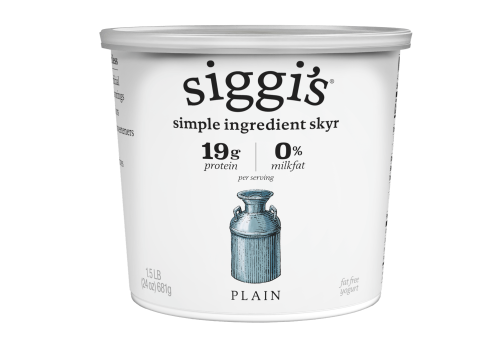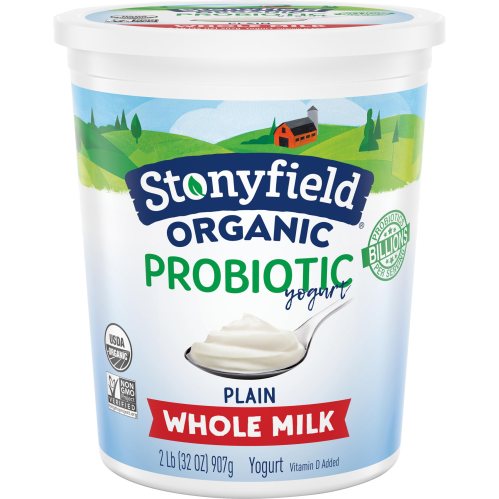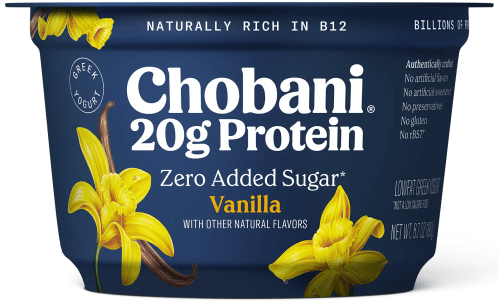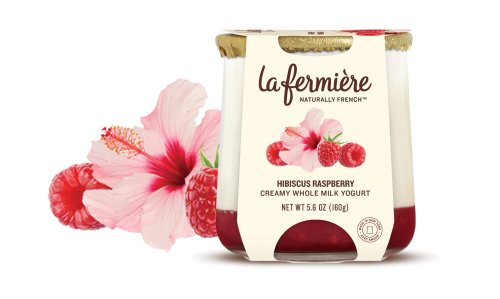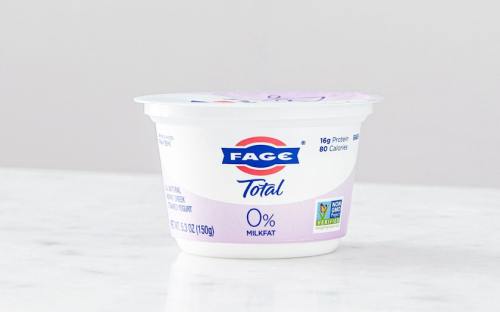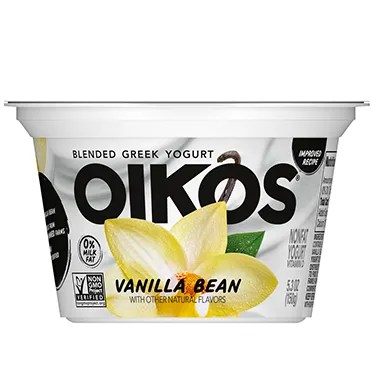When it comes to health trends, protein intake and gut health have topped the list for several years now. And while both are important, eating for these trends can often look very different for different people. Those obsessed with protein intake are (typically) reaching for animal-based protein sources and protein powders while gut health nerds are diligent about their fiber intake (a nutrient exclusively found in plant-based foods) as well as probiotics.
However, one food you’ll find in common between these two eating styles: Yogurt, thanks to both its high protein and probiotic content.
But, have you ever wondered if all yogurts are the same when it comes to probiotics, or ever felt confused about whether live cultures offer the same benefits? You’re not alone. Here experts outline the difference between these two terms as well as highlight a handful of yogurts rich in health-boosting probiotics.
Live Cultures vs. Probiotics
“While all probiotics are live cultures, not all live cultures are probiotics,” says Kaytee Hadley, MS, RDN, IFMCP, founder of Holistic Health and Wellness in Richmond, VA.
“Live active cultures generally refer to bacteria that are used to ferment yogurt,” explains Vandana Sheth, RDN, CDCES, FAND, registered dietitian, author, and nutrition consultant. “While some have probiotic effects, others don't necessarily have proven health benefits.”
Thus, probiotics are proven to have targeted benefits in the gut microbiome—a colony of over a trillion microorganisms largely living in the colon. This microbial community can positively impact several aspects of health including immunity, chronic disease regulation, and brain function. “Probiotics have been shown to [lower] cancer [risk], lower cholesterol, reduce symptoms of irritable bowel syndrome (IBS) and support the treatment of inflammatory bowel disease (IBD),” Hadley adds.
While there are dozens and dozens of beneficial probiotics that we know of (so far) today, you’ll come across some tried and true strains over and over again in many yogurts. “When selecting yogurt for their probiotic benefits, read nutrition labels carefully and specifically look for probiotic strains like Lactobacillus acidophilus or Bifidobacterium lactis,” adds Sheth.
But if you’re not up for scouring yogurt labels at the grocery store, I’ve done the hard work for you, sharing eight tasty options that will help you get your daily dose of probiotics.
The 8 best yogurts for probiotics
The yogurt section of the refrigerator aisle has never been more robust (or overwhelming), with unique dairy and plant-based options continuously rolling out. But aside from probiotics, it’s also important to clock what other nutrients a yogurt choice contains. “In addition to making sure your yogurt contains probiotics, the other two things I recommend looking at are the protein and added sugar content on the label,” Hadley suggests.
Ideally, one serving of yogurt should have at least five grams of protein (upwards of 10 is even better) and no more than nine grams of added sugar (the lower, the better). Here are some varieties that not only taste amazing but generally meet my protein and added sugar criteria while also providing probiotics:
Flavor: Vanilla
Serving Size: 5.3 ounces
Calories: 110 calories
Protein: 16 grams
Added Sugar: 5 grams
While Greek yogurt has taken hold of the high-protein yogurt market in recent years, Icelandic skyr-style yogurt is right on its heels. “siggi’s is thick and creamy with a higher protein content compared to regular yogurt since it’s made with four times as much milk,” says Hadley. “It also has multiple probiotics, including Bifidobacterium, which has anti-inflammatory effects while supporting the immune system.” Sheth agrees, adding that the brand is also “rich in probiotics like L.acidophilus—perfect for gut health.”
Flavor: Low-Fat Vanilla
Serving Size: 6 ounces
Calories: 120 calories
Protein: 6 grams
Added Sugar: 9 grams
When it comes to organic dairy, Stonyfield has been leading the charge for decades. In fact, I vividly remember enjoying this yogurt as a kiddo. And if you’re looking for probiotics, this brand is an ideal option as it contains L. acidophilus, Bifidus (Bifidobacteria), and S. thermophilus—a microbe shown to exhibit potent anti-inflammatory properties. Plus, Stonyfield is extremely accessible. You’re likely to find it at nearly every major supermarket chain nationwide.
Flavor: Vanilla
Serving Size: 6.7 ounces
Calories: 140 calories
Protein: 20 grams
Added Sugar: 0 grams
If you want all the protein and none of the added sugar, Chobani’s High Protein Greek Yogurt is an excellent pick. “Chobani is full of good bacteria for your gut with six probiotic strains,” explains Hadley. “Because Greek yogurt has less lactose (the sugar in cow’s milk) it has a tangier flavor than regular yogurt and is a good option for people with lactose intolerance who don’t want to cut out dairy altogether.”
And you’ll never even realize this product is (added) sugar-free, thanks to the hint of sweetness it offers from the addition of stevia—a plant-based sweetener.
Flavor: Vanilla Bean
Serving Size: 4.9 ounces
Calories: 190 calories
Protein: 4 grams
Added Sugar: 12 grams
For a yogurt that feels more like dessert than a modest breakfast choice, look no further than La Fermière. While the brand’s vanilla yogurt is a touch lower in protein than our guidelines, you can boost this number by serving it with a few add-ins. “Adding protein-rich toppings like nuts and hemp seeds can keep you fuller for longer,” explains Hadley. You’ll still get all of the probiotic benefits from this yogurt, however, thanks to the S. thermophilus bacteria it contains.
This brand is also a standout thanks to its range of enticing flavors including pressed lemon, orange blossom honey, yuzu ginger, matcha lime, jasmine, lavender, and rose, which makes it easy to reach for a protein-filled snack.
Flavor: Plain
Serving Size: 6 ounces
Calories: 120 calories
Protein: 22 grams
Added Sugar: 0 grams
If you’re deeply committed to both your daily protein and probiotic intake, Nancy’s Organic Probiotic Greek yogurt is a great pick. With a staggering 22 grams of protein per serving, you’ll be sure to feel plenty full after savoring a cup of this creamy yogurt.
But it also delivers an impressive array of healthy bacteria, too. “Nancy's Probiotic yogurt has diverse probiotic strains and a tangy taste making it a good addition to smoothies,” says Sheth. In fact, it contains eleven different strains of probiotics, including three strains each of Bifidobacteria, L. acidophilus, and L. rhamnosus, and two strains of L. casei.
Flavor: Vanilla
Serving Size: 5.3 ounces
Calories: 150 calories
Protein: 17 grams
Added Sugar: 0 grams
“Kite Hill Vanilla Unsweetened Greek Yogurt is my personal go-to,” says Hadley. “It’s a non-dairy, Greek-style yogurt that has an impressive 17 grams of protein per serving plus a natural sweetness without any added sugar or artificial sweeteners.” Sheth agrees, sharing, “It’s a delicious dairy-free option with probiotics—ideal for those who are following a plant-based diet or those sensitive to dairy.”
And you won’t be missing out on any of the protein and probiotics gains with this pick, considering 17 grams of protein if boasts and the S. thermophilus, L. acidophilus, Bifidobacteria, and L. plantarum bacteria it contains.
Flavor: Blended Vanilla
Serving Size: 6 ounces
Calories: 120 calories
Protein: 16 grams
Added Sugar: 8 grams
Another grocery store staple, FAGE is widely available, perfectly thick, and chock-full of probiotics. “FAGE Greek yogurt has a smooth and creamy consistency and contains beneficial probiotics,” says Sheth. “It's also high-protein and versatile.”
Their total blended line contains a hefty 16 grams of protein for increased feelings of fullness as well as a variety of probiotics, including S. thermophilus, L. acidophilus, Bifidus, and L. casei. Add it to a smoothie, granola, or baked good for a nutritious boost.
Flavor: Vanilla Bean
Serving Size: 6 ounces
Calories: 120 calories
Protein: 16 grams
Added Sugar: 7 grams
“Oikos Greek Yogurt has a creamy texture and has beneficial probiotics like L. acidophilus," shares Sheth. "It is widely available and great when paired with fruit or nuts." As another common find at many supermarkets, you can rely on Oikos to provide the probiotics your gut craves and the protein your tissues thrive off of without a large amount of added sugar.
Sign Up for Our Daily Newsletter
Get all the latest in wellness, trends, food, fitness, beauty, and more delivered right to your inbox.
Got it, you've been added to our email list.

